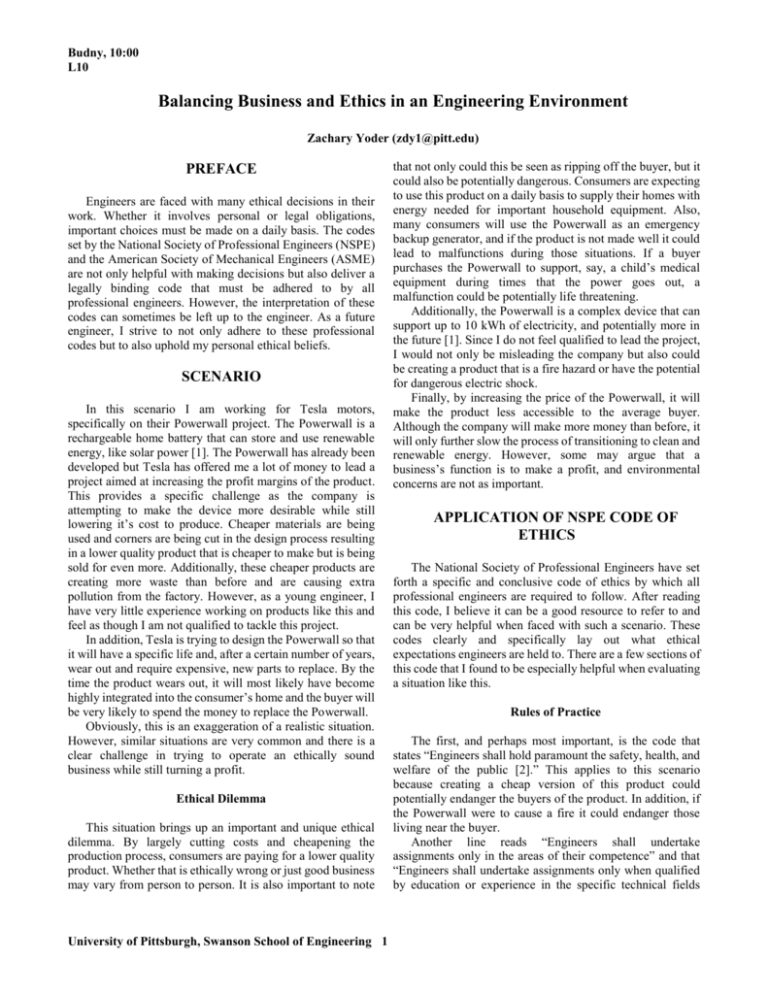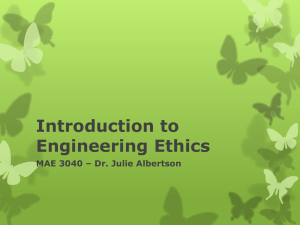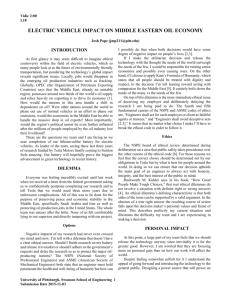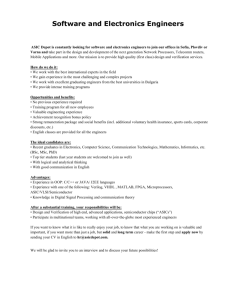Writing Assignment 3 - University of Pittsburgh
advertisement

Budny, 10:00 L10 Balancing Business and Ethics in an Engineering Environment Zachary Yoder (zdy1@pitt.edu) PREFACE Engineers are faced with many ethical decisions in their work. Whether it involves personal or legal obligations, important choices must be made on a daily basis. The codes set by the National Society of Professional Engineers (NSPE) and the American Society of Mechanical Engineers (ASME) are not only helpful with making decisions but also deliver a legally binding code that must be adhered to by all professional engineers. However, the interpretation of these codes can sometimes be left up to the engineer. As a future engineer, I strive to not only adhere to these professional codes but to also uphold my personal ethical beliefs. SCENARIO In this scenario I am working for Tesla motors, specifically on their Powerwall project. The Powerwall is a rechargeable home battery that can store and use renewable energy, like solar power [1]. The Powerwall has already been developed but Tesla has offered me a lot of money to lead a project aimed at increasing the profit margins of the product. This provides a specific challenge as the company is attempting to make the device more desirable while still lowering it’s cost to produce. Cheaper materials are being used and corners are being cut in the design process resulting in a lower quality product that is cheaper to make but is being sold for even more. Additionally, these cheaper products are creating more waste than before and are causing extra pollution from the factory. However, as a young engineer, I have very little experience working on products like this and feel as though I am not qualified to tackle this project. In addition, Tesla is trying to design the Powerwall so that it will have a specific life and, after a certain number of years, wear out and require expensive, new parts to replace. By the time the product wears out, it will most likely have become highly integrated into the consumer’s home and the buyer will be very likely to spend the money to replace the Powerwall. Obviously, this is an exaggeration of a realistic situation. However, similar situations are very common and there is a clear challenge in trying to operate an ethically sound business while still turning a profit. Ethical Dilemma This situation brings up an important and unique ethical dilemma. By largely cutting costs and cheapening the production process, consumers are paying for a lower quality product. Whether that is ethically wrong or just good business may vary from person to person. It is also important to note University of Pittsburgh, Swanson School of Engineering 1 that not only could this be seen as ripping off the buyer, but it could also be potentially dangerous. Consumers are expecting to use this product on a daily basis to supply their homes with energy needed for important household equipment. Also, many consumers will use the Powerwall as an emergency backup generator, and if the product is not made well it could lead to malfunctions during those situations. If a buyer purchases the Powerwall to support, say, a child’s medical equipment during times that the power goes out, a malfunction could be potentially life threatening. Additionally, the Powerwall is a complex device that can support up to 10 kWh of electricity, and potentially more in the future [1]. Since I do not feel qualified to lead the project, I would not only be misleading the company but also could be creating a product that is a fire hazard or have the potential for dangerous electric shock. Finally, by increasing the price of the Powerwall, it will make the product less accessible to the average buyer. Although the company will make more money than before, it will only further slow the process of transitioning to clean and renewable energy. However, some may argue that a business’s function is to make a profit, and environmental concerns are not as important. APPLICATION OF NSPE CODE OF ETHICS The National Society of Professional Engineers have set forth a specific and conclusive code of ethics by which all professional engineers are required to follow. After reading this code, I believe it can be a good resource to refer to and can be very helpful when faced with such a scenario. These codes clearly and specifically lay out what ethical expectations engineers are held to. There are a few sections of this code that I found to be especially helpful when evaluating a situation like this. Rules of Practice The first, and perhaps most important, is the code that states “Engineers shall hold paramount the safety, health, and welfare of the public [2].” This applies to this scenario because creating a cheap version of this product could potentially endanger the buyers of the product. In addition, if the Powerwall were to cause a fire it could endanger those living near the buyer. Another line reads “Engineers shall undertake assignments only in the areas of their competence” and that “Engineers shall undertake assignments only when qualified by education or experience in the specific technical fields Zachary Yoder involved [2].” In this instance I would not consider myself to be qualified to undertake the assignment, therefore violating the code of ethics. Not only could it result in me losing my job, but also in the endangerment of the buyers or workers who would be handling a product that might not be designed properly. Essentially this says that the public trust their welfare and lives with the things that engineers make, and that engineers need to recognize that. Although this does not necessarily apply directly to this situation, I think it is a very important canon in the ASME code that is not included in the NSPE code. The ASME code of ethics goes into more detail about the importance of the environmental issues than the NSPE does, devoting a small section to it. “Engineers shall consider environmental impact and sustainable development in the performance of their professional duties,” with sub points saying that they must consider environmental health risks and must work on “development that meets the needs of the present” without putting future generations at risk [3]. This further stresses the importance of using environmentally friendly materials and creating minimal waste product while still striving to develop clean energy products like the Powerwall. Professional Obligations “Engineers shall advise their clients or employers when they believe a project will not be successful [2].” Since I recognized that this process could be potentially dangerous or might not even work, I would be obligated to let my employer know. One of the most applicable codes is “Engineers are encouraged to adhere to the principles of sustainable development in order to protect the environment for future generations [2].” Although this code is more of a suggestion than a requirement, I still find it very important. Engineers are ethically obligated to work for a cause greater than the collection of wealth. In this case, the Powerwall has the potential to be a defining tool in the transition to renewable energy. Footnote 1 describes sustainable development as “the challenge of meeting human needs for natural resources, industrial products, energy”…“while conserving and protecting environmental quality and the natural resource base essential to future development [2].” This specifically brings up the importance of using sustainable materials and eliminating unnecessary waste, both of which would not be followed in this scenario. This does not mean that we should shy away from developing such technology. Oppositely, this calls engineers to work even harder at developing effective, renewable energy resources and tools, but in sustainable ways. USEFULNESS OF CODES Through my understanding of these codes of ethics, I believe that they can be incredibly helpful when making an important decision. The codes specifically lay out what engineers are obligated to do. They are also very extensive and can apply to almost any situation. It can help to simplify the decision making process by looking at specific canons in writing. That being said, I do not think that the codes should be a one stop all-encompassing decision making tool. Engineers will need to consider multiple sources, in addition to the codes, as well as their own personal ethics in order to make an informed decision. Additional helpful sources APPLICATION OF ASME CODE OF ETHICS An additional source that I found valuable in the decision making process was an article that I found online about practically applying ethics to situations like this. Overall it discussed the process of taking “abstract” ethics, like the overarching themes that people try to live by, and narrowing that down to practical rules and figuring out how to actually apply those ethical values [4]. A second additional source that I found to be helpful when approaching a situation like this is a verse from the Bible. Although I am not the most religious person, I feel that this verse is very applicable to almost any ethical dilemma. Mark 8:36 says “For what does it profit a man to gain the whole world and forfeit his soul [5]?” Essentially what this verse is saying is that no amount of wealth is worth compromising your own personal beliefs and values. I think this is something that should be considered when making any sort of ethical decision. The American Society of Mechanical Engineers lays out another code of ethics that are to be followed by all professional mechanical engineers. The ASME code is very similar to the NSPE code. As a whole I did not find the ASME code to be significantly more helpful than the NSPE. It would be more helpful if the ASME code contained more information specifically for mechanical engineers. That being said, there were a few parts that I found to have more detail than the NSPE code did, and I think they apply well to this scenario and could be helpful with situations similar to this. The ASME code of ethics brings up a general statement that is covered in the NSPE but not stated as clearly. “Engineers shall recognize that the lives, safety, health and welfare of the general public are dependent upon engineering judgments, decisions and practices incorporated into structures, machines, products, processes and devices [3].” 2 Zachary Yoder dangerous to anyone who buys it. Although it would probably work well for a while, the product would eventually wear out and might fail a family who requires it in a critical time. For example, if a family buys the Powerwall to support important medical equipment and fails when it is needed, I would feel partially responsible for contributing to a medical emergency. INFLUENTIAL EXAMPLES There are many other examples that would influence my decision in this scenario. One important outside example that I would look to is a decision my father made as an attorney. My dad is a big role model of mine, and he has greatly influenced my decision making my whole life. Both my parents have instilled in me strong ethical values, for which I am very grateful. My dad was an attorney who was just starting out at the time and was approached by a high profile client that could offer a lot of money. Because his work has strict confidential issues, I will be vague. Essentially, the client was engaged in activities that were against my dad’s personal ethics. He declined to take on the client’s case [6]. Although taking on this client would have resulted in a big boost for my dad’s career, as well as a lot of money, he valued his own personal beliefs above the desire for wealth. I have a lot of respect for my dad for doing that, and I hope that in the future I will be able to do the same. PERSONAL DECISION After considering the NSPE and ASME code of ethics, as well as examining my own personal beliefs, I have come to the conclusion that I would not accept this position. Accepting this position would clearly violate both the NSPE and the ASME codes, which would not only be ethically wrong but also professionally and legally wrong. I would be accepting a project that I am not qualified for and would be producing a cheap and potentially dangerous product. More importantly, I would be strongly violating my own personal beliefs and would be working in a job that I would not feel good about and would leave me feeling guilty. INFLUENCE OF PERSONAL ETHICS RECOMMENDATIONS FOR HANDLING SIMILAR SITUATIONS My preexisting personal beliefs and experience would greatly influence how I would approach a situation such as this. I have always had a strong passion for the environment. I love the outdoors and have always spent time with my family camping, hiking and fishing. The continued use of fossil fuels is deteriorating the environment and will eventually cause irreparable damage. Therefore, as an engineer in this situation I would be thrilled to have this job, and would feel like I truly am helping to make a difference by developing the Powerwall technology. Working on this project would be incredibly rewarding for me and a job offer like this would be nearly impossible to turn down. That being said, I would also have to consider many other personal beliefs before making a decision. I have been raised to always be honest. By accepting this project, I would be going against that. I would be lying to the company by leaving them under the impression that I am qualified for this position. I would also be lying to the consumer by approving a product like this and saying it will work well, when in reality it is poorly made and likely to wear out after a few years. By accepting this position, I would be asked to create and approve a product that I know is made of cheap materials and not of the highest quality. I do not believe that making low cost, cheap products that have a high profit margin to be right. This is cheating the consumer. My parents always got frustrated when they would buy expensive products that would work for a little while and then suddenly stop. I would not feel comfortable working in a position where I am producing something like that. I would also be very uncomfortable knowing that a product that I am in charge of producing would be potentially Through examining the codes, researching similar situations, and considering my own personal ethics, I have come up with a process that I believe can be used to determine the proper course of action for any situation in which an engineer is presented with an ethical dilemma. First, the engineer should consult the code of ethics. The code applies to most situations and can give important direction. It it also important to examine this carefully as engineers are professionally obligated to follow this code. If the decision they make violates the code, they could face employment and legal consequences. If the code of ethics does not apply to the situation, or does not provide a conclusive answer, the next step would be to do research. I was surprised at how many online resources there are relating to ethical engineering decisions. One could research their situation and find other times that engineers have faced the similar scenarios and how they responded. If, after considering multiple sources, the engineer is unable to come to a decision, they should turn to family, friends and personal beliefs. Friends or family members can be a great source of wisdom, and they might have even been through the same situation before. If the engineer is religious, consulting religious material or asking mentors or pastors can be helpful as well. CONCLUSION Engineers will often be faced with making important and sometimes difficult ethical decisions. After examining the 3 Zachary Yoder NSPE and ASME codes of ethics I believe they can be very helpful when faced with a tough ethical decision. Most importantly, though, the engineer must do what personally feels right. REFERENCES [1] E. Musk. (2015). “Tesla Powerwall.” Tesla (Website). http://www.teslamotors.com/powerwall [2] National Professional Society of Engineers. (2007). “Code of Ethics for Engineers.” National Professional Society of Engineers. (Online article). http://www.nspe.org/sites/default/files/resources/pdfs/Ethics/ CodeofEthics/Code-2007-July.pdf [3] American Society of Mechanical Engineers. (2006). “Society Policy.” American Society of Mechanical Engineers. (Online article). https://www.asme.org/getmedia/9EB36017FA98-477E-8A73-77B04B36D410/P157_Ethics.aspx [4] Q. Wang, W. Zhang, Q. Zhu. (2015). “Directing engineering ethics training toward practical effectiveness.” Technology in Society. (Online article). [5] The Student’s Bible. (2011). “Mark 8:36.” (Print). [6] J. D. Yoder. (2015, October 27). Telephone interview. [7] NSPE Board of Ethical Review. (2013). “Public Health and Safety – Delay in Addressing Fire Code Violations.” National Society of Professional Engineers. (Online article). http://www.nspe.org/sites/default/files/BER%20Case%20No %2013-11-FINAL.pdf [8] “The Green Revolution.” Online Ethics Center for Science and Engineering. (2013). (Online article). http://www.onlineethics.org/Resources/Cases/GreenRevoluti on.aspx [9] WebGURU. (2015). “It Only Takes a Second.” WebGURU. (Online article). http://www.webguru.neu.edu/professionalism/casestudies/it-only-takes-second [10] J. Basart. (2011). “Engineering Ethics Beyond Engineer’s Ethics.” Springer Science+ Business Media. (Online article). [11] N. Burcea. (2014). “Business Ethics.” Journal of Public Administration. (Online article). ACKNOWLEDGEMENTS I want to thank my writing instructor, Dr. Koerbel, for helping me out last minute to make sure my paper was formatted correctly. I also want to thank my dad, Dwight Yoder, for telling me about his own experiences and helping me get started on this paper. Finally, I want to thank my roommate Dan Kachnycz for always keeping me focused and encouraging me to start early. 4






